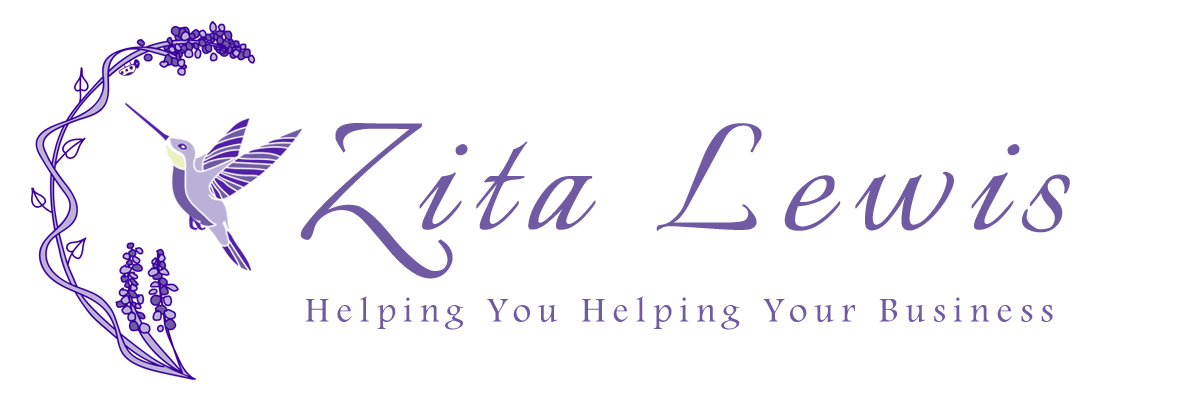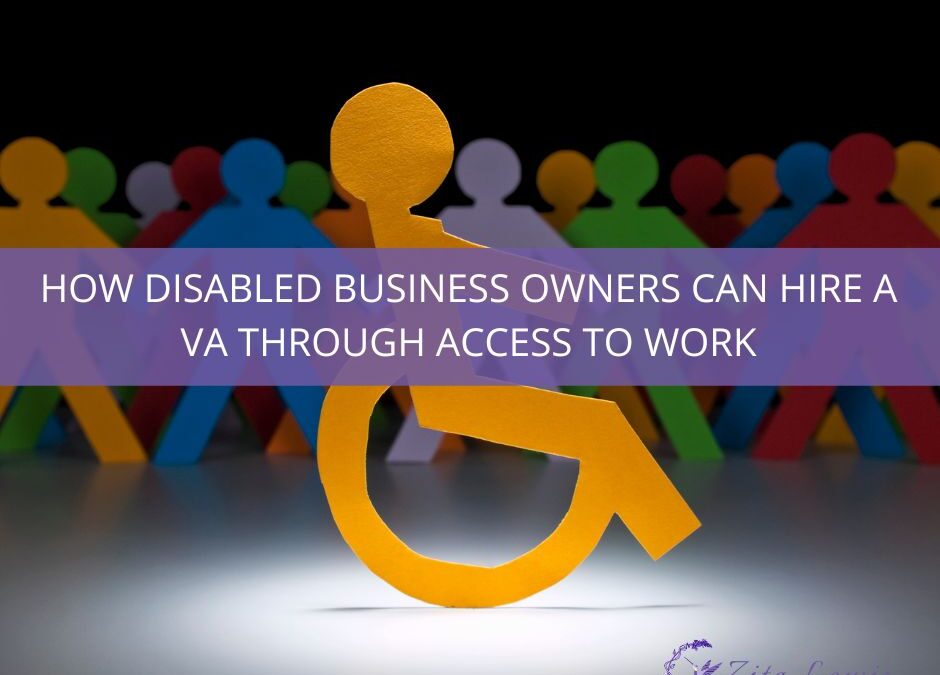The Self-Employed Disability Guide to Hiring a VA with ‘Access to Work’
The ‘Access to Work’ scheme is a UK government initiative that provides practical support to the employed and self-employed who have disabilities, ensuring that everyone has equal access to employment opportunities. This includes financial assistance for services that can enhance work efficiency, such as the hiring of a Virtual Assistant (VA).
For professionals navigating their business with a disability, a VA can be a strategic asset. The scheme acknowledges the diverse needs of individuals and offers support tailored to each person’s unique work situation. It’s not just about funding; it’s about enabling professionals to operate at their best, with the right support in place.
Selecting a VA is a significant business decision. The right VA will have a combination of skills, experience and the ability to understand and adapt to your specific business requirements. It’s about finding a professional who can seamlessly integrate into your business, contributing to its growth and efficiency.
Understanding ‘Access to Work’: A Gateway to Inclusive Entrepreneurship
At its core, ‘Access to Work’ is about acknowledging that everyone has unique abilities and challenges. It recognises that the standard work environment and tools may not suit everyone, especially those with disabilities. This scheme is designed to provide the additional support necessary to ensure that your health condition or neurodivergence does not become a barrier to your professional success.
Who is Eligible?
General eligibility criteria for Access to Work includes:
- You have a mental or physical impairment or health condition.
- Your impairment or condition has lasted or is likely to last, 12 months or more.
- Your impairment or condition impacts your ability to work.
- You are aged 16 or over.
- You live in England, Scotland, or Wales (as there are different systems in Northern Ireland, the Channel Islands, and the Isle of Man).
- You are in paid work, about to start work, or are self-employed.
If you’re self-employed, you’re eligible if you work full or part-time hours but your earnings must be above the Lower Earnings Limit (LEL). They will look at your Self-Assessment Tax records to determine if you meet the criteria. If you’re starting a new business, you may still be eligible, they’ll need to see a business plan showing how you’ll meet the LEL and they’ll check your first tax return to see you’ve met that threshold.
What Support Does Access to Work Offer?
The scheme can cover a wide range of support based on individual needs, including:
- Special equipment or software that makes work tasks more accessible
- Transport solutions if your condition makes using public transport challenging
- A support worker or job coach to assist with specific work tasks
- Disability awareness training for colleagues
- The cost of moving your business to an accessible location
And notably, for the self-employed, it can cover the services of a Virtual Assistant to manage those administrative and organisational tasks that are crucial for business but may be daunting due to your condition.
Each application is dealt with on a case-by-case basis by the Access to Work team – you can find out more about applying here. It’s a good idea to think about the equipment and help that would support you as your advisor may not have a complete understanding of your condition, or how it affects you at work. Explaining how A VA can help you manage your workload, plan and meet deadlines and be able to continue/grow your business as a result, will be useful.
How Does it Work?
‘Access to Work’ is tailored to your specific needs. It starts with an assessment to understand the unique barriers you face and the type of support that would benefit you. The goal is to provide practical help that minimises the impact of your disability or health condition on your work.
By covering the extra costs of working that you might face due to your condition, ‘Access to Work’ ensures that you’re not at a disadvantage. It levels the playing field, giving you the same opportunities to succeed as anyone else in the entrepreneurial landscape.
The Role of a Virtual Assistant for the Self-Employed with Disabilities
A VA’s role is varied and can adapt to the unique requirements of your business and the support you need due to your disability, chronic illness, or neurodivergence. This can include:
Email Management: a VA can filter your inbox, prioritise important communications and handle responses. This can be particularly useful if you find social interactions difficult and/or exhausting.
Scheduling: a VA can help you manage appointments, reminding you of important events and ensuring you never miss a meeting. With a keen eye on timelines, VAs ensure that all projects are on track, providing gentle reminders and time management support – this can be helpful if you have ADHD, brain fog or fatigue that affects your memory.
Document Management: From preparing invoices (check the VA has AML registration) to managing client files, a VA can help keep your paperwork in order, saving you from the quagmire of administrative tasks. This is useful if you struggle to keep track of things or meeting deadlines due to fluctuating illness, or ADHD.
Customer Service: Acting as the first point of contact, VAs can provide customer support, enhancing your business’s reputation for responsiveness and professionalism. This can be particularly helpful if you’re autistic and find social interactions difficult.
A VA’s support isn’t just about completing tasks but about helping you create an environment that makes it easier for you to work in your role as an entrepreneur or business owner. Sometimes, just knowing there’s someone to handle the details can alleviate the stress and anxiety that often accompany business management for disabled individuals.
Selecting Your Ideal Virtual Assistant for Access to Work
The right VA can be instrumental in managing your workload and contributing to the overall success of your enterprise but it’s vital they are attuned to you, your business and your specific needs as a disabled business owner.
Understanding Your Needs
The first step is to gain a comprehensive understanding of your business needs. This involves a detailed analysis of your daily activities to pinpoint which tasks could be effectively managed by a VA. Think about how your condition affects you and which tasks are the hardest for you to manage.
You should also consider the kind of people you get along with best in terms of personality type. You might benefit more from a VA who is proactive and autonomously driven, while others might prefer someone who excels at following detailed instructions. Communication style is an important factor here too – if you find phone or video calls difficult and draining, a VA that can work through email instruction is going to be easier for you than a VA who prefers to work through ‘check-in calls’.
Armed with a clear understanding of your requirements, the next phase is to embark on the search for candidates. Using professional networks like LinkedIn can connect you with VAs who possess the background and skills you’re looking for. Do note as well that not all VAs work within the Access to Work scheme so it’s a good idea to check this before you begin speaking to candidates.
Don’t underestimate the power of referrals within your professional network, as personal recommendations can lead to finding a VA whose capabilities and work ethic are already proven. Facebook groups for the disabled, chronically ill or neurodivergent self-employed can help you with this, as many have already navigated the process of hiring a VA for their business.
Assessing Experience with Disability and Neurodiversity
It’s so important that you find a VA who is competent in the tasks they’ll be looking after for you, but also have a deep understanding and empathy of what being a disabled, chronically ill or neurodivergent business owner is actually like. Indeed, there are many VAs who are disabled themselves and, like you, have chosen self-employment as a good way of managing their condition.
The ideal VA should be flexible and capable of customising their support to accommodate your unique working methods. Effective communication is paramount, ensuring that your VA can provide the clarity and support needed to navigate the business landscape. The most important thing here is that they are willing to listen and learn from you. It doesn’t really matter if they have first-hand experience working with disabled clients so long as they are open-minded and willing to take your lead on things.
The decision to select a VA should be based on a balance of professional skills, relevant experience and personal attributes that align with your business ethos. By adopting a methodical and strategic approach to this selection process, you can secure a VA who not only meets your requirements but also becomes an integral and valued contributor to your business journey.
As a self-employed business owner with disabilities, the ‘Access to Work’ scheme offers you a powerful avenue to enhance and grow your business through the support of a Virtual Assistant. A VA can be a transformative addition to your business, taking on the tasks that challenge you the most and providing the freedom to focus on what you do best.
When it comes to selecting a VA, consider it an investment in your business’s future. Look for someone who not only has the right skills but also the right approach to working with you. They should be someone who is genuinely interested in making a difference in your business. If you’d like to discuss how I can help you and your business through the Access to Work scheme, get in contact with me now for a friendly chat.

